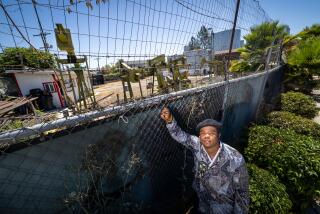Op-Ed: Why I’m not looking forward to the new year

A decoration to celebrate New Year’s Day is put into place in Port Huron, Mich.
My daughter Hannah died last year. A tumor slowly ate away at her 17-year-old brain, causing her to lose motor function, speech, life. It was March 2014. All the treatments and clinical trials and prayers couldn’t stop it. And I still don’t have the words to talk about it.
I’m supposed to be somewhat dexterous with language. I teach high school English, and I even wrote a book recently. I don’t often have a hard time coming up with something to say or a way to say it. When it comes to talking about Hannah’s death, however, things have been different. As conversations with new acquaintances tilt toward family, and there’s no avoiding the matter, I give her death a quick and cursory mention. I’ve adopted this technique partly out of empathy for the poor person who could not possibly have seen this turn in the conversation coming, and partly out of self-preservation, so I can navigate it quickly, compartmentalize my emotions and then get back to getting through the day.
There is no chance that I’ll forget my daughter, of course, but the calendar can’t possibly jibe with my emotions. The years are moving too fast for me now.
But embedded deep within this terse treatment of my profound pain is a subtle language mechanism, a secret code I’ve clung to as a means of coping. When I say, as I did earlier, “My daughter Hannah died last year,” I know that those two essential words — “last year” — keep me in the immediate wake of it all and somehow keep my daughter here and close and present.
In 2014, it was raw, and there was no doubt we were in the midst of our tragedy. She had “just died.” Throughout 2015, saying “last year” has certainly put the event in the past linguistically, but anyone truly listening can sense that it is ever present. It still seems like yesterday, and I and my family continue to wear our grief like a threadbare garment.
With 2016 approaching, though, just what exactly am I supposed to say? What language am I supposed to use? Come Friday I will no longer be able to refer to “last year” when discussing Hannah’s death. I’ll need to put a date on it, a year on it, making it somehow historical and
creating distance. My daughter’s death will become some static event in time. And, because time passes, and the years turn, we will be expected to move on.
Never before has New Year’s Eve, with its countdown to midnight, its simple turn of a calendar page, its song of old acquaintance being “forgot,” brought on such dread and utter confusion about moving forward. There is no chance that I’ll forget my daughter, of course, but the calendar can’t possibly jibe with my emotions. The years are moving too fast for me now.
While memories of Hannah remain, like the comfort of lingering smoke from a favorite candle, the year’s end will be coaxing us to throw open the windows and clear the air for rebirth and renewal. But I don’t want to clear the air. I want to remember. I want to slow it all down and just sit for a while, not moving until I’m ready, not talking about it until I can get the words right.
Instead of a new year with new numbers, I need a new language that allows me to linger. And wait. And hold on.
Michael Metzler is a father, husband, teacher and author living in upstate New York.
Follow the Opinion section on Twitter @latimesopinion and Facebook
More to Read
A cure for the common opinion
Get thought-provoking perspectives with our weekly newsletter.
You may occasionally receive promotional content from the Los Angeles Times.










